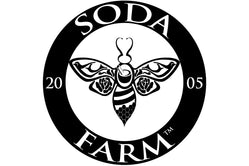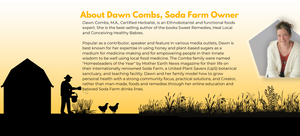Sourdough and Family Culture
NOTE: My sourdough classes are available any time inside the Proactive Health Club membership, but please watch for in-person sourdough classes that I host from time to time.
A few weeks ago just before closing time a new customer came into the store. It had been a hard day and I really just wanted to get home, but I’m so glad she stopped! After selecting a soda, she asked me about our classes. She wanted to talk about the sourdough class in particular. I’ve been teaching real sourdough for almost 10 years now, it’s a passion of mine and there are a lot of reasons why it is so important to me.
Salt Bread
My customer settled in to share about her family’s salt bread. Her grandmother used to make it and it showed up at every family gathering. There was no formal recipe, as these things go, and the real story started when her grandmother began to decline and no one had good instructions for preserving the tradition. Salt bread appears to have a number of different variations and additives, depending on the family, but involves a “starter” that leavens the bread without commercial yeast. The work it took to bring the bread back to family gatherings was a lot of trial and error, calling the remaining family elders, and a bit of intuition. She finally succeeded in making a salt bread that was like her grandmother’s and is ensuring that her own grandchildren are still connected to their heritage every time they eat some.
Salt bread is a great example of the food culture (literally) that the Western world is fast forgetting. We are in a downward spiral of gut issues and digestive diseases… could this be related?
Baker's Yeast vs. Wild Yeast
Until about 160 years ago the only way to make bread rise was using a wild yeast, or a bacteria in the case of salt bread. Baker’s yeast came about because of a desire for uniformity, ease and convenience, but it has nothing to do with real health. Baker’s yeast, or the commercial yeast we can buy at the store, is not a reproducible commodity. It is technically living, but only in the confines of boosting the loft of the loaf into which it’s mixed.
Baker’s yeast consumes sugar and produces carbon dioxide gas. Because this yeast is brought to life in the baking process itself and the only product we require is a rise, this has increased the amount of sugar in our bread products. Wild (or family) yeasts produce lactobacilli bacteria that also consume proteins in the grain, such as gluten. The by-product of this consumption is the lactic acid that gives these types of breads their sour taste.
A Solution to Gluten Intolerance?
Those with gluten intolerance (not true celiac) would be much better off eating true sourdough because the gluten is “pre-chewed” if you will. Breaking down the large proteins makes grain more digestible to anyone, including those who are having trouble digesting a particular protein. I, myself, have recovered from gluten intolerance using sourdough.
So… bread is yet another area of our Western diet where we are consuming vast quantities of a product that is designed for convenience and efficiency rather than for health. A return to true sourdough is much more than just a quaint practice that produces unique flavors… it is a return to our roots and a return to a healthy way to consume grains.
The sourdough culture that I use in my home, and that I use to teach classes, was started by one of my students in class with me about nine years ago. I had stepped away from sourdough over the past five years and was recently planning to start a new culture when I was gifted with a portion of one I had a hand in all those years ago. “Olivia” as this culture is named has been traveling back and forth to a home in Florida in the cold months in her very own cooler. She has lovingly made years of nourishing food for this family and extended family that I have grown to love… and now she’s back in my kitchen to share with many more students while feeding my own family again. This connection to ourselves, our community and our past is one of the biggest benefits of a culture like this.
Sourdough "Culture"
Sourdough cultures were once gifted at weddings to a newly started family. They lived for hundreds of years passing from one generation to the next. They housed the family’s probiotics, yes, but they also embodied love, reverence and remembrance. When a young woman kneaded the family bread, she looked down and could see her grandmother’s hands, remember her grandmother’s voice and honor all those who came before her.
At one time the cultures that lived among us were highly revered. Digestion was easier and food intolerance was rare. Now we kill all of the organisms around us and eat food that is dead or fake. Cultures do not live on the counter, they are not passed from one generation to another with reverence. Now we buy a pill to replace bacteria in our guts and eat bread leavened with yeast that was developed in a sterile lab.
Let’s keep this conversation going… Every one of my sourdough classes dives deeper into why we make, keep and eat these cultures. With each offering students can learn how to make a different bread product with the same culture… and they will all leave with a bit of Olivia to nourish their own families.
Do you have a sourdough culture in your family? What do you bake daily/weekly/monthly?



2 comments
kt,
January is sourdough month around here on the farm. The first Taste the Farm of the year will focus on getting people started with the basics and hopefully inspire others to keep going. In 2024, that date is January 20, but you can find all our event dates (and themes) on our Events Calendar page under the Classes & Events tab.
-Dawn
I do not have a culture or one within my family but starting to learn to bake bread has been a discussion between my dad and myself for the last month so i found it interesting you posted this post. Are you thinking of doing a class soon? Have a beautiful day!